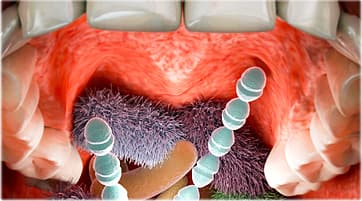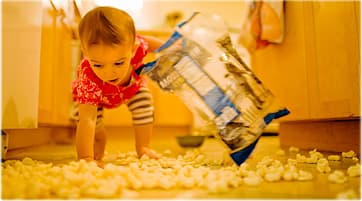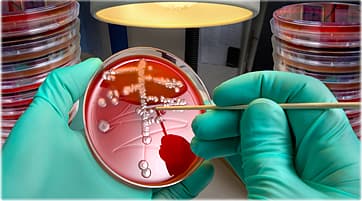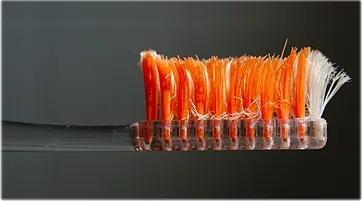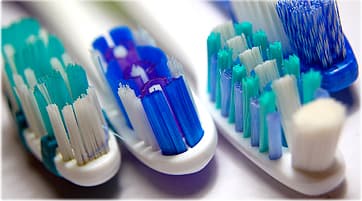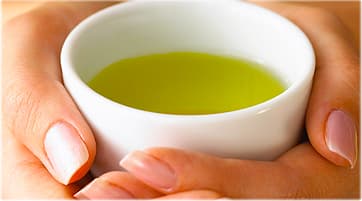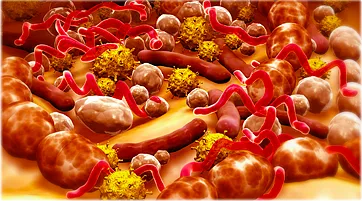PROTECT YOUR TEETH WITH THE FACTS!
- Sugar Is The Prime Cause Of Cavities
Myth & Fact: In reality, it's the acid produced by the bacteria in your mouth. The bacteria eats carbohydrates. When you eat anything with carbs ,(ie-sugar, rice, bread, fruits & vegetables...) the bacteria becomes active & produce acid that eats into your tooth. In fact, frequency is more harmful than quantity>>>If you eat a lot of carbs for lunch, that's one big exposure, But if you spend the day sipping sugary drinks, that's continuous exposure-much more dangerous for your teeth
.
2.
Exposure To Acidic Foods Like Lemons Causes Tooth Decay
Fact: Acidic foods such as lemons, citrus juices or soft drinks don't cause cavities, but may be putting your enamel in danger. Acids can cause erosion of the tooth-protecting enamel,weakening the tooth. Exposing the underlying dentin makes the tooth more prone to decay.
3.
Kids Are A Lot More Likely To Get Cavities Than Adults
Myth: With the help of sealants, fluoridated water & preventive care, dental caries in school-aged children have actually been decreased by 50% in the last 20 years. However, there has been an increase in cavities in Senior Citizens. Some medications tend to reduce the saliva flow, causing dry mouth (xerostomia). Saliva has important enzymes that neutralize acids, has a disinfectant quality, washes away bacteria, and helps prevent food from sticking to your teeth.
4.
Aspirin Placed Next To A Tooth Will Help A Toothache
Myth: Swallowing aspirin is what helps reduce toothache pain. Since aspirin (Acetylsalicylic Acid) is acidic, placing it besides the tooth can actually burn your gum tissue, causing an abscess.
5.
All Fillings Eventually Need Replacing
Fact: Fillings do have life expectancy, but it depends on >>> tooth wear & oral hygiene habits. Brushing 2x/day with fluoridated toothpaste & flossing daily will decrease the chances of tooth decay& your fillings may last longer.
6.
If You Have A Cavity, You'll Know It
Myth: Mild tooth decay doesn't cause symptoms. The pain we associate with cavities comes when tooth decay is more advanced causes damage to the nerve. Allowing tooth decay to advance (Waiting for it to hurt),can lead to much more expensive procedures, like root canal .That is why regular dental checkups are so important!
7.
Clenching & Grinding (Bruxism) Leads To Cavities
Myth & Sometimes Fact: Clenching & grinding (Bruxism) is
one of the most destructive thing you can do to your teeth! These parafunctional habits put tremendous pressure/strain on your teeth for extended periods leading to cracks & fractures. Those fractures exposes the weaker dentin, tooth decay can form @ a faster rate which can lead to crowns or even root canal to treat the traumatized nerve.
8.
Sensitivity In Teeth Means You Have Decay
Myth:Tooth sensitivity could just mean you have hypersensitive teeth, or gum recession has exposed some root surface. You could have a cracked or broken tooth or even need a root canal. There are many things including decay that could lead to sensitive teeth.
9.
You Don't Need To Worry About Cavities In Baby Teeth
Myth: If cavities are left untreated in baby teeth, they can develop into serious pain & abscess. Occasionally, the infection can spread to other areas of the body & in rare cases even results in death.
10.
Brushing & Flossing Is The Best Way To Prevent Cavities
Fact: ABSOLUTELY! Prevention is the key. You need to remove bacteria from teeth by flossing & brushing twice a day with a fluoridated toothpaste.
